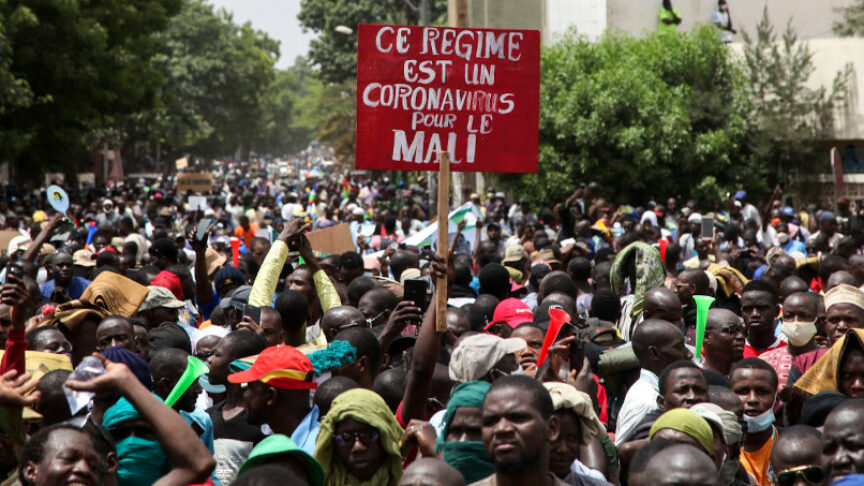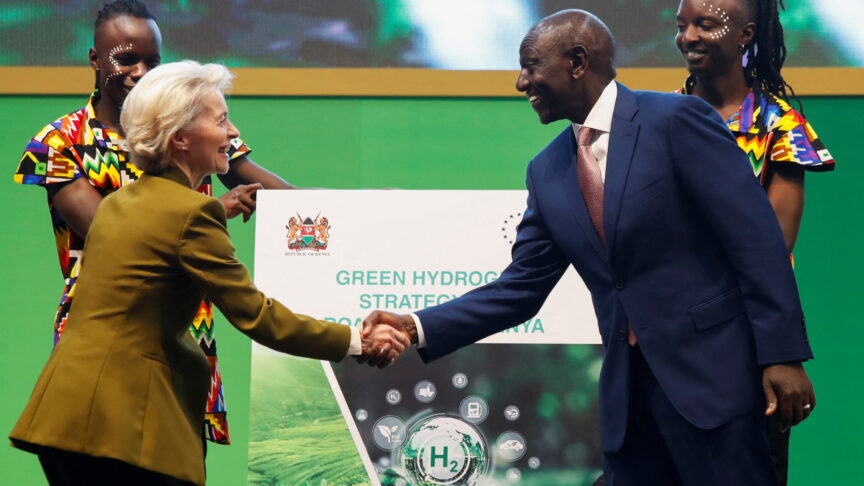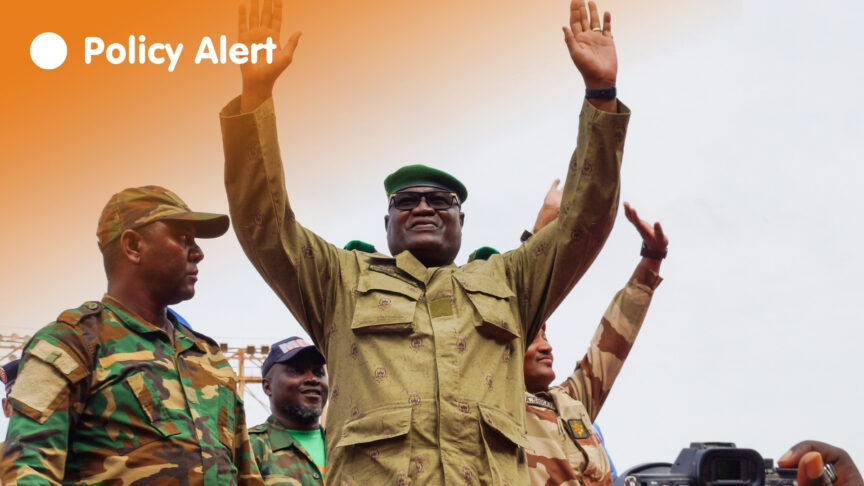Unchecked escalation: Why Mali is in turmoil
Mali’s politics is undergoing radical change, partly due to years of discontent with its entire political and economic elite.
Mali’s ongoing political crisis came to a head on 10-12 July, as the country’s security forces – possibly including an elite anti-terrorist unit – killed at least 11 people. Figures within the opposition claim that there were twice as many casualties. The security forces arrested several opposition leaders, holding them in sometimes harsh conditions before releasing them on 13 July.
The 10 July protest organised by the opposition coalition Mouvement du 5 Juin-Rassemblement des Forces Patriotiques (M5-RFP) was its third large-scale demonstration in Bamako since June. The movement is composed of an assortment of groupings and people from different ideological and political backgrounds. Its most visible figures is influential imam Mahmoud Dicko, a former head of Mali’s High Islamic Council. The protesters who gathered on 10 July amid calls for civil disobedience subsequently fanned out through Bamako’s streets, shutting down its two main bridges, occupying the national television station, and looting and setting fire to parts of the National Assembly, located a stone’s throw from the city’s Grand Mosque.
The M5-RFP had vowed to hold a protest and a mass prayer last Friday in memory of demonstrators who had been killed, and to engage in civil disobedience until President Ibrahim Boubacar Keita (known as IBK) resigned. But the movement’s leaders postponed the protest in light of the arrival of a mediation mission from the Economic Community of West African States (ECOWAS), headed by former Nigerian president Goodluck Jonathan. The delegation left Bamako over the weekend without reaching an accord. This signalled not only that the parties had hardened their political positions following the killings of protesters, but also that unrest and anger against IBK had grown far beyond the initial causes of the demonstrations that began in June. Another delegation that includes five West African presidents and Jonathan will arrive on 23 July to continue meeting with IBK, as well as with Dicko and other representatives of the M5-RFP. But, so far, conventional responses such as those proposed by ECOWAS have not been enough to fix the growing political contestation and opposition in a country already beset by an array of conflicts and tensions.
Reasons for the protests
Political disputes have been intensifying across Mali for years as corruption allegations swirl and the country’s security situation continues to worsen. The proximate cause of the protests, however, was controversial legislative elections that took place over two rounds in March and April. These elections – marked by low turnout, fears about covid-19, and insecurity that disrupted or prevented regular voting in parts of central and northern Mali– also saw the kidnapping of opposition leader Soumaila Cissé while he campaigned in his home region.
In late April, Mali’s Constitutional Court invalidated 31 election results, awarding ten additional seats to IBK’s ruling Rassemblement pour le Mali party and thereby giving it a parliamentary majority. But the protests have moved beyond just anger at the elections; the M5-RFP has called into question Mali’s entire system of governance and demanded IBK’s resignation, while catapulting Dicko to the centre of political tumult in the country once again.
There has also been a subtle but palpable change in the very concept of politics in Mali. This is linked partly to the behaviour and personality of Dicko, and partly to the result of months and years of discontent with not just IBK but the country’s entire political and economic elite.
Political disputes have been intensifying across Mali for years as corruption allegations swirled and the country’s security situation continued to worsen.
Who is involved in the protests?
Mali’s political leadership has long been very insular – and has grown even more so under IBK. But, despite being a part of public life and even state-affiliated institutions, Dicko has at key moments rejected symbols of subordination and formal political roles for himself, cultivating an image as an equal to IBK in ways that have bolstered his standing and credibility. After meeting with IBK earlier this month, Dicko said that the president had offered him ministerial posts in the new government and other, unnamed privileges – reportedly in exchange for dropping his political demands. Dicko publicly rejected the offers.
His prominence and popularity are perhaps one reason why he was not arrested on Saturday, even as security forces hauled other opposition leaders off to jail. His conservative religious views and public opposition to IBK since 2018 – as well as his long history of public intervention in politics on social and legal issues, including the foreign military presence in Mali – have raised questions and generated uneasiness about his plans for the country, particularly in Europe.
Dicko is first and foremost a religious leader. His past political interventions are strongly informed by conservative religious views and a moral critique of contemporary Malian society. However, Dicko’s societal critiques and push for greater Islamisation of public life are hardly unique to Salafi Muslims such as him. And while it may not be clear what kind of final state a religious leader such as Dicko wants to build, moral discussions of social and political life carry meaning and value for many Malians – even those who remain avid defenders of the secular state. Dicko’s reputation for moral rectitude and reserve also help burnish his standing in public life, particularly in comparison to other religious figures and members of Mali’s political elite.
And, while Dicko is the most visible member of the opposition coalition, he is not its only leader and does not have a monopoly on its supporters. Even within his own movement, Dicko often publicly takes a much softer line than Kaou Djim, coordinator of the Coordination des Mouvements, Associations et Sympathisants (CMAS). Even when Dicko and the CMAS briefly signalled that they might accept a compromise that would keep IBK in power, other members of the coalition held fast to their demands that the president resign.
What will happen next?
Both IBK and the international community have dramatically underestimated the depth of discontent at the root of the current protests. Since the demonstrations began, Mali’s political leadership and that of regional bodies and the international community have taken a cautious approach to the demonstrations, offering only limited solutions to try to placate the opposition. Last month, an ECOWAS delegation suggested that IBK’s administration should revisit the issue of contested parliamentary seats and call for a government of national unity. In the lead-up to the protest planned for 10 July, and after weeks of consultations and negotiations with Dicko and other members of the government and civil society groups, IBK finally adopted the ECOWAS recommendations and called for a government of national unity – only for the opposition to roundly reject the proposal.
IBK and the international community have misunderstood the seriousness of the opposition’s demands and its commitment to removing him from power, or to at least dramatically altering the government. The M5-RFP has publicly announced that it sees Mali’s political troubles as directly related to IBK’s way of governing, not just the improper allocation of parliamentary seats.
Despite one M5-RFP leader initially calling for more civil disobedience after the failure of the ECOWAS negotiations, the coalition this week announced a “truce” in the ten days leading up to the Eid al-Adha holiday on 31 July, with plans to resume acts of civil disobedience afterwards. The movement has also received small signs of support from outside Bamako, including in the northern cities of Gao and Timbuktu. And some public sector unions had vowed to join the civil disobedience campaign before the announcement of the truce. What happens next may depend on the ongoing mediation efforts of UN, AU, EU, and ECOWAS representatives in Bamako. Further concessions by the Malian government – including an investigation into the killing of protesters, as the opposition demands – will be necessary to resume the negotiations.
The delay in the protests and the arrival of the new high-level ECOWAS delegation will provide an opportunity to ease tensions and seek a political solution to the demonstrations. And the pause in activism may drain some energy from the opposition movement. However, the core political problems in question remain. And it is difficult to see what the government could do to satisfy opposition demands, short of dissolving parliament and providing the M5-RFP with influence and representation that goes beyond simply being given posts in a new government. The opposition may retreat from its maximalist position to avoid further violence, even if this would anger some opposition supporters. But the problems that have been building up for years are now fully in the open, and the dam holding back some of the more severe anger at the government has now broken. It is unlikely that Mali will return to politics as usual any time soon.
The European Council on Foreign Relations does not take collective positions. ECFR publications only represent the views of their individual authors.



